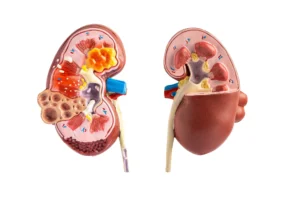Kidney Transplant in Turkey
A kidney transplant from a living donor is often the best option for many patients due to several reasons:
- Better long-term outcomes
- No need to be placed on a waiting list for a deceased donor kidney
- The ability to schedule the surgery at a convenient time for both donor and recipient
- Reduced risk of complications or rejection
- Better early function of the transplanted kidney
Can Anyone Donate a Kidney?
Yes, any healthy individual can donate a kidney. When a living donor donates their kidney, the remaining kidney enlarges slightly to take over the work of two kidneys. Donors do not require special medications or diets once they recover from surgery. Although complications are possible, kidney donors have the same life expectancy, general health, and kidney function as others. Additionally, losing one kidney does not interfere with fertility.

Table of Contents
Cost of Kidney Transplant in Turkey:
- Average Cost: $20,500
- Minimum Cost: $18,500
- Maximum Cost: $26,000
Comparison of Kidney Transplant Costs Between Turkey and Other Countries:
| Country | Cost |
|---|---|
| USA | $90,000 |
| Germany | $86,000 |
| France | $83,000 |
| Spain | $69,000 |
| Turkey | $20,500 |
If you are interested in traveling to Turkey for a kidney transplant, contact us to guide you to the best specialized hospitals with the highest success rates and the most affordable treatment costs.
Get a Medical Consultation
Video: How Kidney Transplants Are Performed Using Robotic Surgery in Turkey
Watch the video to see all the medical details related to kidney transplantation in Turkey:
Watch the Video
Kidney Transplant Timeline in Turkey
| Stage | Duration |
|---|---|
| Surgery | 3-5 hours |
| Hospital Stay | 4-5 days |
| Stay in Turkey | Approximately 1 month |
| Full Recovery | 4-8 weeks |
Health Information About Kidney Transplant
What Is a Kidney Transplant?
A kidney transplant is a surgical procedure to treat kidney failure by transplanting a healthy kidney from a living or deceased donor into the recipient.
Who Needs a Kidney Transplant?
A kidney transplant may be an option if the patient’s kidneys have stopped functioning completely, a condition known as end-stage renal disease (ESRD). In such cases, doctors may recommend dialysis initially, followed by evaluating the patient for a kidney transplant.
Who Can Donate a Kidney?
- Living Donor:
Since the body can function well with just one healthy kidney, a donor could be a family member with two healthy kidneys. If the donor’s blood and tissue types match the recipient’s, a transplant date can be set. Receiving a kidney from a family member reduces the risk of rejection and bypasses the waiting list for deceased donor organs. - Deceased Donor:
A kidney from a deceased donor is a good option if no living donor is available. However, in Turkey, this option is not permitted for foreign patients.
Compatibility Tests Before Kidney Transplant:
- Blood Type Test: Determines the patient’s blood type (A, B, AB, or O).
- Human Leukocyte Antigen (HLA) Test: Identifies antigens that trigger immune responses. Matching HLA types between donor and recipient reduces rejection risks.
- Crossmatch Test: The patient’s blood is mixed with the donor’s blood to ensure no antibodies are produced that could attack the donated kidney.
How Is the Kidney Transplant Performed?
Generally, the patient’s damaged kidneys are not removed unless medically necessary. The transplanted kidney is placed in the lower abdomen, where it is easier to connect to major blood vessels and the bladder. The procedure usually takes 4-5 hours.

